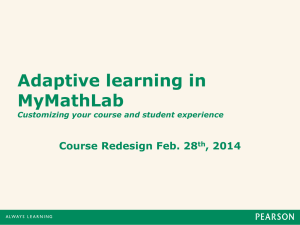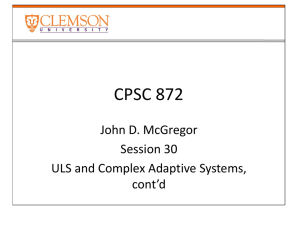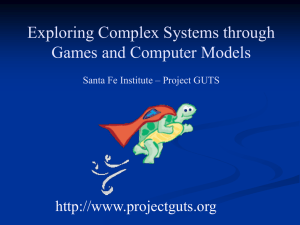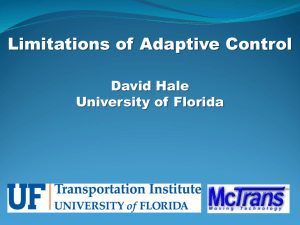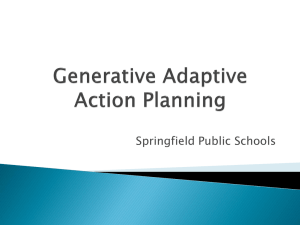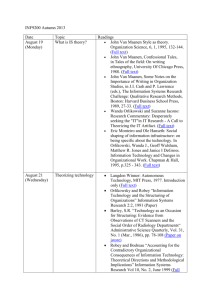The Qualitative Continuum Part 2
advertisement
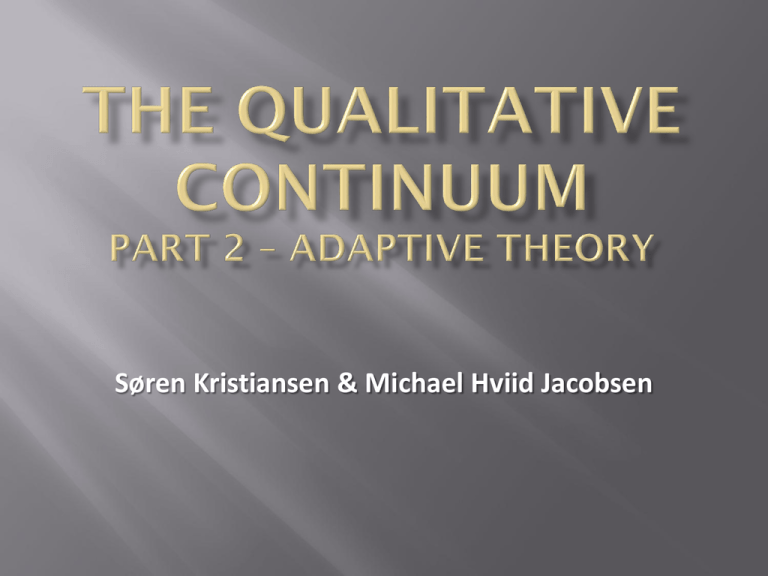
Søren Kristiansen & Michael Hviid Jacobsen “Like grand theory, abstracted empiricism seizes upon one juncture in the process of work and allows it to dominate the mind. Both are withdrawals from the tasks of the social sciences. Considerations of method and theory are of course essential to work upon our tasks, but in these two styles they have become hindrances: the methodological inhibition stands parallel to the fetishism of the concept … Empirical data are blind without theory, and theory is empty without data” - C. Wright Mills: The Sociological Imagination (1959) Most of us probably have to admit that we are neither merely empiricists (radical inductionists) or theoreticians (radical deductivists) but that our work lingers uneasily somewhere between the two poles as a hybrid and that we are always looking for a way to legitimate this hybrid identity Adaptive theory Radical induction/ grounded theory Analytic induction Extended case method Recontextualizing method - theory + theory + data - data Conceptual and Hypothesis testing Investigation of a Alternative/creative theoretical and refinement limited area ways of reframing development through the through primary phenomena in new primarily based continuous and secondary data frames, providing them on the collection elimination of and aimed at with new and often and analysis of deviating cases revision and surprising meaning, e.g. primary data Verification/ extension of existing through metaphors and Exploration falsification theory alusions Reconstruction Abduction Interplay between theory and data aimed at theoretical development/theorizing • • • • • • Developed by Derek Layder in Sociological Practice (1998) as a critique of but also correction particularly to the methodology of grounded theory Rests on a critical realist methodology that is skeptical of empirical research without theoretical guidance, which distrusts the notion that people can necessarily understand or see through their own lives and which aims at developing and refining theory-laden and theory-directed knowledge Layder describes ‘adaptive theory’ as an ‘approach’ rather than as a methodology, research tradition or position So far the approach has not received much attention or mention in sociological methodology circles The approach offers a middle-position between radical induction and a theory-based Throughout the years, many other researchers have worked with a variety of often unreflected and under-theorized methodological middlepositions – Layder seeks to spell out and systematize such efforts Realism Structure Adaptive Theory Micro Constructivism Agency Subjective Objective Macro “In a nutshell, adaptive theory, as I conceive it, is an original amalgam of different influences and approaches that falls somewhere between what are variously referred to as deductive or theory-testing approaches on one side and inductive or theorygenerating approaches on the other … Adaptive theory draws upon the whole range of approaches to theorizing in research … Adaptive theory uses both inductive and deductive procedures for developing and elaborating theory” (Layder 1998:5, 38, 136-138). “The ‘adaptive’ part of the term is meant to suggest that the theory both adapts to, or is shaped by, incoming evidence at the same time as the data themselves are filtered throufgh (and adapted to) the extant theoretical materials that are relevant and at hand” (Layder 1998:38) Theory Data The main purpose and task of adaptive theory is to assist the researcher in • • • • Thinking theoretically informed about a host of social issues and themes (as an ‘imaginative rehearsal’, as Layder dubs it) Not necessarily aimed at the development of a systematic theory as such but the continuous process of using existing theories and based on these (in combination and interplay with data) developing new theoretical ideas, insights and theoretically informed concepts and understandings Being inspired by a vast pool of various theoretical literature – specific as well as general (and even alternative sources) – and extracting interesting and promising ‘orienting concepts’ to guide and accompany (but not direct or control) the analytical process Being able to select the most relevant and most useful theoretical ideas in the vast pool of existing ideas and concepts • In principle any theoretically informed concept/notion that can guide or promote theorizing – however, two conditions ought to be met: 1. Their two-sided nature – binding social structure and subjective experience together 2. Their reference to social processes – tracing activity and events through time and place • Can be extracted from any existing body of theory (general or specific), substantive areas of research (e.g. medical sociology), adjacent areas of research (e.g. psychology), from utterly surprising sources (films, poetry, posters, etc.) or from one’s own intuition and sensitivity “The best use of individual concepts drawn from a wider body of theory or knowledge is as a means of cranking up the process of theorizing – either by elaborating on extant theory or by generating theory in relation to researh evidence. By using such concepts as orienting devices the researcher is provided with a preliminary means of ordering and giving shape to a mass of data” (Layder 1998:23-24). • • • • • • • • • • ‘Emotion work’ (Arlie Russell Hochschild) ‘Face work’ (Erving Goffman) ‘Joggling’ (Barney G. Glaser and Anselm L. Strauss) ‘Moral career’ (Erving Goffman and Howard S. Becker) ‘Moral, calculating or estranged involvement’ (Amitai Etzioni) ‘Impression management’ (Erving Goffman) ‘Vagabonds and tourists’ (Zygmunt Bauman) ‘Military-industrial complex’ (C. Wright Mills) ‘Social frames’ (Erving Goffman) ‘Awareness contexts’ (Barney G. Glaser and Anselm L. Strauss) Inspired by grounded theory’s coding procedures, Layder suggests three steps to coding in adaptive theory: 1. 2. 3. Pre-coding (the initial and often inspirational work with finding and organizing interesting sections, paragraphs or concepts in data) Provisional coding (close to pre-coding but often attached to theoretical ideas and notions) Core and satellite coding (linking and interplaying data and orienting concepts in novel and more systematic ways thereby refining the theorizing process by finding out what links well with what) A sociology student recently used the adaptive ‘approach’ in her master’s thesis on cutting and self-harm among young girls Literature: Specific psychological, sociological and medical literature on cutting and more general social theory on deviance, secrecy, recognition, etc. Orienting concepts: Recognition, stigma, passing, shame, embarrassment, etc. – concepts connecting the individual/subjective experience with wider social/societal/structural conditions and reactions Empirical work: Interviews with young girls, expert interviews and internet ethnography on a homepage for cutters Analysis: Organized on the orienting concepts with the development of new concepts and typologies as the end-goal (theorizing) • • • • • • The actual relationship between induction and deduction remains unclear – what is prioritized when, where, why and how How to proceed (practically) in the research process (e.g. combining orienting concepts with data) is under-theorized Structure/system level concepts are favoured by Layder on behalf of more individual or interactionist level concepts It seems unclear when an adequate adaptive theory is developed The proposal to allow or even suggest a broad eclectic approach to the use of orienting concepts might foreshadow a more substantial understanding of the theories in use Apart from this, adaptive theory offers a refreshing and to some extent useful alternative to the other four positions on the qualitative continuum • • • • • Qualitative data analysis is concerned with finding order, patterns, structure, direction and meaning in often large lumps of material taken from various sectors of social life Creating this order/patterns/structure/direction/meaning can be done by a very data-driven procedure or strategy (e.g. grounded theory), by way of a relatively theory-driven procedure or strategy (e.g. the recontextualizing method) or by a middle-way procedure or strategy (e.g. adaptive theory) The result of these different procedures or strategies can be new theory, revised/refined theory, validated theory, extended theory, developing typologies, concepts and metaphors, etc. All these procedures/strategies have their individual potentials and pitfalls Depending on the specific procedure or strategy used, the different steps in the research project will vary considerably “There are no methods without deficiencies and every method causes certain methodological difficulties for the researcher … A razorblade as well as an axe are equally precise instruments, but when it comes to deforestation the axe is much better. The axe is a powerful tool just as the razorblade but it is much better to use a razorblade than an axe for shaving” - Zygmunt Bauman (1966) • Derek Layder (1998): Sociological Practice – Linking Theory and Social Research. London: Sage Publications. • Michael Hviid Jacobsen (2007): “Adaptiv teori – den tredje vej til viden: En stående invitation til syntesesociologi”, i Rasmus Antoft, Michael Hviid Jacobsen, Anja Jørgensen & Søren Kristiansen (red.): Håndværk & Horisonter – tradition og nytænkning i kvalitativ metode. Odense: Syddansk Universitetsforlag, pp. 249-291.
